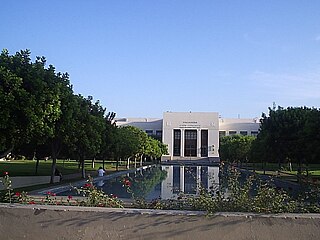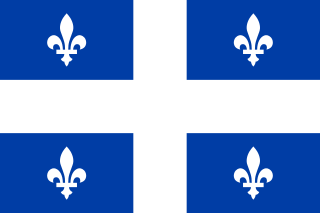
A community college is a type of educational institution. The term can have different meanings in different countries: many community colleges have an "open enrollment" for students who have graduated from high school. The term usually refers to a higher educational institution that provides workforce education and college transfer academic programs. Some institutions maintain athletic teams and dormitories similar to their university counterparts.
Education in Quebec is governed by the Ministry of Education, Recreation and Sports. It is administered at the local level by publicly elected French and English school boards. Teachers are represented by province-wide unions that negotiate province-wide working conditions with local boards and the provincial government of Quebec.
An associate degree is an undergraduate degree awarded, primarily in the United States, after a course of post-secondary study lasting two or three years. It is a level of qualification between a high school diploma or GED and a bachelor's degree.
A Master of Advanced Studies or Master of Advanced Study is a postgraduate degree awarded in various countries. Master of Advanced Studies programs may be non-consecutive programs tailored for "specific groups of working professionals with well-defined needs for advanced degree work" or advanced research degrees. With the exception of the UK, advanced studies programs tend to be interdisciplinary and tend to be focused toward meeting the needs of professionals rather than academics.

Cégep Limoilou is a French-language CEGEP in the province of Quebec, situated in La Cité-Limoilou, a borough of Quebec City.

Cégep de la Gaspésie et des Îles is a bilingual english and french college of general and vocational education, with an English section, in Gaspé, Quebec, Canada. The CEGEP is affiliated with the ACCC, and CCAA.

Cégep de la Pocatière is a Cégep in La Pocatière, Quebec, Canada.

The Cégep régional de Lanaudière is a Cégep, made up of three constituent colleges in Joliette, L'Assomption and Terrebonne, located in Quebec, Canada.
LaSalle College is a Canadian for-profit college founded in 1959. Based in Montreal, Quebec, the institution offers both vocational and pre-university programs. LaSalle College offers over 60 programs. LaSalle College is composed of 5 schools: Fashion, Arts & Design, Hotel Management & Tourism, Business & Technologies, Humanities & Social Sciences and E-Learning.
The CEGEP of Saint-Jérôme or Cégep de Saint-Jérôme (CSTJ) in French is a post-secondary education school in the Laurentides region of the province of Quebec. There's three campuses affiliated to the CSTJ, the main one is located at Saint-Jérôme. The two others are in Mont-Tremblant and Mont-Laurier, in the Hautes-Laurentides

Higher education in Quebec differs from the education system of other provinces in Canada. Instead of entering university or college directly from high school, students in Quebec leave secondary school after Grade 11, and enter post-secondary studies at the college level, as a prerequisite to university. Although both public colleges (CEGEPs) and private colleges exist, both are colloquially termed CEGEPs. This level of post-secondary education allows students to choose either a vocational path or a more academic path.
DEC, dec or Dec may refer to:
L'école de musique Vincent-d'Indy is a subsidized private music college situated in Montreal, Quebec, Canada in the Outremont district, that specializes in music education.
Cégep de Sainte-Foy is a French-language CEGEP in Quebec City, Quebec, Canada. It is located in the borough of Sainte-Foy–Sillery–Cap-Rouge. There are nearly 8,000 students registered at the college, making it one of the largest in the province outside of Montreal. It was founded in 1967.
The Diplôme d'études universitaires générales, abbreviated DEUG, was a French national degree. It was delivered between 1973 and the LMD reform by universities one year before the license.
The Cégep de Chicoutimi is a post-secondary institution in the province of Quebec, Canada. It is located in the Chicoutimi borough of the City of Saguenay. It is one of four CEGEPs in the Saguenay-Lac-Saint-Jean region.
Attestation of College Studies (ACS) is the name for a certificate awarded by a college in the Canadian province of Quebec. The Quebec education system is unique in North America, one aspect of that uniqueness is that it is the only system that has four different education levels: elementary school, high school, college, and university.
This page is based on this
Wikipedia article Text is available under the
CC BY-SA 4.0 license; additional terms may apply.
Images, videos and audio are available under their respective licenses.







